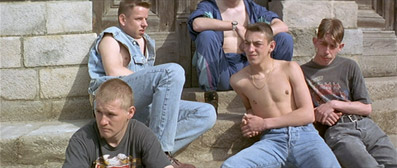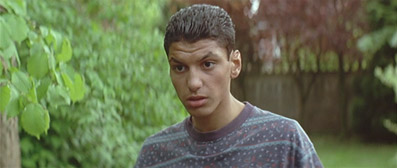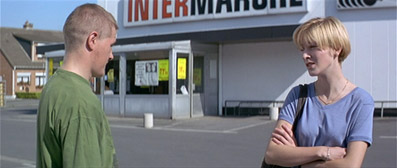|
Don't be misled by that title, whatever your religious persuasion. La Vie de Jesus [The Life of Jesus] is not a retelling of the bible story, a Jesus of Montreal-style updating of it, or even an allegorical interpretation of the same. And just so you know, there's no-one in the film named Jesus, even in its Spanish pronunciation. The title is not abstractly chosen, but there's a good chance that its true meaning will remain the subject of speculation for most viewers, at least until they read the booklet that accompanies this DVD.
The characters at the centre of La Vie de Jesus, the 1997 debut feature from Bruno Dumont, are a group of bored, unemployed young males who spend their days sitting around, restoring a car back to health, and driving around their rural home town of Bailleul and the surrounding countryside on their motorbikes (whose annoying high-pitched whine will be all-too familiar to a fair few UK viewers). The focus of the film's attention is Freddy, whose mother runs the local café bar and who is the only one of the group to have a girlfriend. His relationship with supermarket checkout girl Marie is passionate and physical, and apart from the chaffinch he keeps as a pet, it's the only aspect of his life that appears to any have real meaning.

Boredom is a risky subject to try and capture on film if you are to avoid inflicting the same condition on your audience, but right from the opening frames Dumont strikes a fine balance between observing life as experienced by Freddy and his friends, and maintaining a pace of narrative development that assures that we don't get to share it. In the process he achieves a strong cinematic empathy for his characters, no easy feat considering that getting the film made required Dumont to display the very sense of purpose and life direction that Freddy and his friends are lacking.
There are plenty of familiar wayward youth touchstones here, including the group's head-on game of chicken with a speeding rally GTI, while Freddy's quiet devotion to his chaffinch even has a whiff of Kes about it. The group also display a contempt for specific others that appears to have grown from ignorance rather than experience, and it's in the encounters that arise from this that our bond with Freddy is most uncomfortably tested. Their molestation of an overweight local girl is made all the more unpleasant by their dismissal of the act as no big deal (she's too disgusting to rape, they reason), even after they have been dressed down and seemingly humbled by the girl's father. But it's their giggling racism towards local Arab boy Kader and his father that most clearly point the way to problems to come.
Not everything about Freddy's life plays to expectations. His friend Cloclo – group member Michou's brother – is laid up in hospital and dying from AIDS, while Freddy himself suffers from epilepsy, adding an element of deadly chance to his motorbike rides and his spells behind the wheel of their rebuilt car. Perhaps the group's most surprising diversion, at least for this outsider unfamiliar with the life and rituals of rural France, is their collective role in the municipal fanfare, whose rehearsals and performances they participate in without protest, their only real act of even mild rebellion being an energetic burst of synchronised drumming that nonetheless ceases the moment the time for their parade arrives.

Few will be surprised by the direction the boys' conflict with Kader takes or the inevitably tragic results, especially once Kader begins doggedly pursuing Marie behind Freddy's back. That this narrative predictability does the film no serious harm is down to Dumont's way with character and his assured handling of individual scenes. The bond between Freddy and Marie is defined as much by their ease in each other's company as by the energy of their explicitly presented sexual encounters, and when their relationship falters these two aspects remain in tandem – when sex is denied, Marie's body language takes a defensive turn. Freddy's standing with his friends, meanwhile, is defined in an almost throwaway comment from Michou, who on being told that Freddy has a trip to the coast organised for him as a tribute to his now deceased brother, says simply but respectfully "Freddy thinks of everything." The scene in which Michou sits in the car and confesses his loneliness to his friends is one of the most effective and revealing in the film, and the one time we really get beneath the surface of this troubled, aimless, but nonetheless interesting bunch.
Featuring a cast of untrained first-timers, the film benefits from their relaxed naturalism and real-world looks, and in the case of lead player David Douche this does tend to compensate for his limited range as a performer – he's clearly not an actor, but troubled expression and unsettled body language make him consistently intriguing and quietly expressive nonetheless. Marjorie Cottreel, on the other hand, plays Marie with the confidence and subtle facial communication of an actress of some considerable experience, while Freddy's mates have the sort of faces a savvy casting director would die for.
La Vie de Jesus may not be a revolutionary debut but it is an arresting one, breaking little new ground but exploring sometimes familiar territory with fresh eyes and an involving empathy for its troubled and directionless characters. Peppered with moments of unexpected tenderness and visual elegance, it's a confident and impressive first film that bagged a number of prestigious awards for Dumont, who was to confirm his talent two years later with the compelling (and opinion-dividing) L'Humanité.
A very nice anamorphic 2.35:1 transfer that easily meets the high standards that Masters of Cinema have set for their DVD releases. Sharp without evidence of edge enhancement and with an attractive, pastel-biased colour palette, the picture quality at best is close to pristine, though the contrast does show some minor variations, with black levels in some shots not quite as solid as they are in others. Given the overall quality of the transfer, the suspicion is that this variation is on the film print.

A clean, clear Dolby 2.0 mono soundtrack with a decent dynamic range, effectively capturing the silences and the diegetic music without issues.
The optional English subtitles are very clear and pleasingly use British English, hence Marie's claim at one point that she's "knackered."
Original Trailer (1:35)
An interesting pre-release trailer that includes brief interviews in which the actors speculate on the meaning of the title.
Booklet
Another well produced MoC booklet containing Dumont's working notes on the film, two revealing interviews with the director, a number of high quality stills and reproductions of some of the Braque paintings that first inspired Dumont's approach to the film.
A compelling first film from Dumont that points the way to the second and for my money the best of his features to date, though he's still only released four (with another in the pipeline), so there's plenty of time yet to equal or even top it. Masters of Cinema's DVD is shy on extras but really delivers on the picture quality, and the booklet, though not as densely packed as some, proves a most informative read.
|